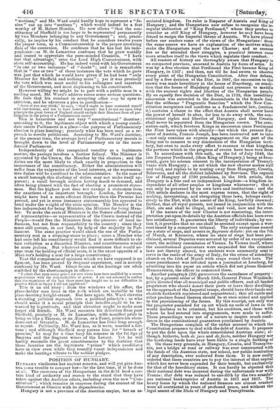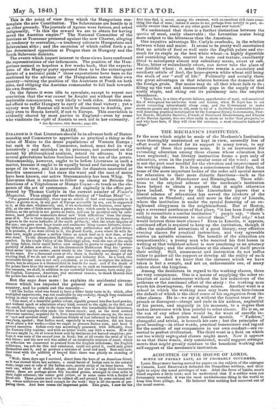POSITION OF HUNGARY.
HUNGARY vindicates her ancient renown, and will yet give Aus- tria some trouble to conquer her—for the first time, if it be done at all. The successes of the Hungarians in the field lend a cer- tain kind of authority and reason to the stand that they have taken against the Austrian edicts, including even the new " Con- stitution" ; which remains in suspense during the contest of the Government at Olmiitz with its dependencies.
Hungary is not a province of the Austrian empire, but an as- sociated kingdom. Its ruler is Emperor of Austria and King of Hungary ; and the Hungarians now refuse to recognize the ir- regular abdication of "King Ferdinand," whom they profess to consider as still King of Hungary, however he may have been forced to resign the Imperial throne of Austria.. We have placed before our readers some of the views of the Hungarians: /*roar the same source we have an explanation of the motives which make the Hungarians repel the new Charter ; and as success has so far attended their struggles, a practical interest once more attaches itself to the views which regulate their conduct., - All readers of history are thoroughly aware that Hungary is no conquered province, annexed to Austria by force of arms. It was by a free election that Ferdinand the First became King of Hungary, in 1527; and then, not till he had swOrn 'to observe every point of the Hungarian Constitution. After free debate, and by a free decision of the Diet, in 1687, the succession to the crown was made hereditary in the house of Hapsburg, on condi- tion that the house of Hapsburg should not presume to meddle with the ancient rights and liberties of the Hungarian people. By an equally free decision of the Diet, in 1723, this hereditary succession was extended to the descendants in the female line. But the selfsame "Pragmatic Sanction" which the New Con- stitution recognizes and confirms as a fundamental law, (section 9,) contains a clause to the effect that Austria shall never have' the power of herself to alter, far less to do away with, the con- stitutional rights and liberties of Hungary, and that Croatia shall never be separated from the Hungarian crown. The coro- nation-oath, which fourteen Kings in succession since Ferdinand the First have taken with alacrity—but which the present Em- peror of Austria, Francis Joseph, has been instructed not to take —not only contains an express engagement on the part of the King not to consent to any diminution of the Hungarian terri- tory, but even to make every effort to reannex to that kingdom the portions which in the progress of events have been torn from it. In accordance with this oath, on the 1st of July 1848, the late Emperor Ferdinand, (then King of Hungary) being at Inns- pruck, gave his solemn consent to the incorporation of Transyl- vania with Hungary ; an act which the new charter makes null and void, and replies to by tearing away from Hungary, Croatia, Sclavonia, and all the district inhabited by Servians. The organic law of Hungary of 1790 proclaims, in the 10th article, that Hungary is a free and an independent kingdom—a kingdom in- dependent of all other peoples or kingdoms whatsoever ; that it can only be governed by its own laws and institutions : and the 12th article declares in the most express terms, that the right of making, interpreting, and abrogating those laws, belongs exclu- sively to the Diet, with the assent of the King, lawfully crowned; further, that all royal patents, not issued in conjunction with the Diet, are and shall be illegal, null and void, now and for ever.
If the nature of the new Charter is not reassuring, the inter- pretation put upon its details by the Austrian officials has been even less satisfactory. It guarantees the liberty of individuals ; by sec- tion 8, it provides that no one shall be arrested except upon a war- rant issued by a competent tribunal. The only exceptions named are a state of siege, and arrests infagrante delieto : yet on the 7th of March, at Kreinsier, where no state of siege had been pro- claimed, several Deputies were arrested by order of an exceptional court, the military commission of Vienna. In Vienna itself, where the constitutional guarantees were suspended but the criminal laws not thereby altered, ten students were summarily sent to serve in the ranks of the army of Italy, for the crime of attending church on the 12th of March with crape round their hats. The same punishment was inflicted upon a journalist at Lemberg, for admitting into his paper an article which did not please General Hammerstein, the officer in command there. Another paragraph (29) guarantees the sacredness of property : but, by a general order of March 13th, General Prince Windisch- griitz directed that all municipal and public officers, and all landed proprietors who should desert their posts or leave their dwellings on the approach of the Imperial troops, should have their lands and chattels forthwith registered and sequestrated ; that all cattle and other produce found thereon should be at once seized and applied to the provisioning of the forces. By this rescript, not only was the proprietor punished for an act which no code of laws in the world declares to be criminal, but his creditors, and those with whom he had entered into engagements, were made to suffer. These proceedings were not of a nature to inspire much confi- dence in the constitutional guarantees proclaimed by Austria. The Hungarians complain of the unfair manner in which the Constitution proposes to deal with the debt of Austria. It proposes to put the, debt upon the whole consolidated Austrian state; al- though hitherto, both de jure and de facto, neither Hungary nor the bordering lands have ever been liable to a single farthing of it. On these very grounds, in Hungary, Croatia, and Transylva- nia, not a bridge or road or railway was ever constructed with the funds of the Austrian state, nor school, nor public institution of any description, ever endowed from them. It is now coolly ordered that these countries are to pay the interest of that capital which has never been expended for their benefit, but exclusively for that of the hereditary states. It can hardly be objected that their national debt was incurred during the unfortunate war with France: that debt was reduced to one-fifth by the two scandal- ous national bankruptcies of Austria in 1811 and 1817. The heavy loans by which the national finances are almost crushed were all contracted in years of profound peace, and without the legal assent of the Diets of Hungary and Transylvania.
This is the point of view from which the Hungarians con- template the new Constitution. The Selavonians are hostile to it on other grounds. The journals of Agram were furious' and asked indignantly, "Is this the reward we are to obtain for having saved the Austrian empire?" The National Committee of the Servians at Temesuar protested against the new Charter, alleging its tendency to centralize —a tendency odious to Hungarians and Sclavonians alike ; and the suspicion of which called forth a no less determined opposition at Prague than in Hungary and the South Sclavonic districts.
The events which impart interest to these views have confirmed the representations of our informants. The position of the Hun- garians seemed so hopeless a few weeks back, that the expecta- tions of the Magyar party appeared then to be the extravagant dictate of a national pride :* those expectations have been so far confirmed by the advance of the Hungarians across their own country—turning the position of the Austrians at Pesth on both sides, and obliging the Austrian commander to fall back towards his own frontier.
On the future it were idle to speculate, except to repeat our conviction that the war cannot be fought out without the most deplorable consequences, very likely to both sides. Austria can- not afford to suffer Hungary to carry off the final victory ; yet a victory won by Russian aid would be disastrous to Austria, pos- sibly even to Russia herself, if not to Europe. This conviction is evidently shared by most parties in England—even by some who vindicate the right of Austria to seek aid in her extremity.
* See Spectator, 10th March ; page 225.



























 Previous page
Previous page